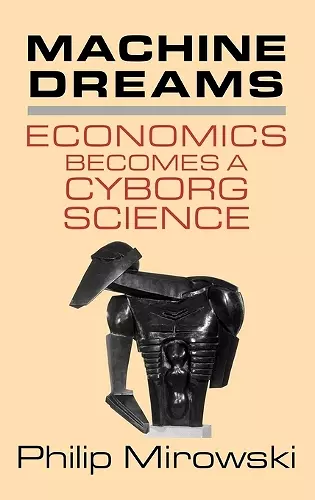Machine Dreams
Economics Becomes a Cyborg Science
Format:Hardback
Publisher:Cambridge University Press
Published:3rd Dec '01
Currently unavailable, currently targeted to be due back around 15th April 2025, but could change
This hardback is available in another edition too:
- Paperback£56.99(9780521775267)

Machine Dreams recounts how the computer has transformed the content of American economics.
Machine Dreams recounts the story of how the computer came to transform the very content of American economics, and how the mathematician John von Neumann inadvertently became the most important thinker for the economics profession in the 21st century.This was the first cross-over book into the history of science written by an historian of economics. It shows how 'history of technology' can be integrated with the history of economic ideas. The analysis combines Cold War history with the history of postwar economics in America and later elsewhere, revealing that the Pax Americana had much to do with abstruse and formal doctrines such as linear programming and game theory. It links the literature on 'cyborg' to economics, an element missing in literature to date. The treatment further calls into question the idea that economics has been immune to postmodern currents, arguing that neoclassical economics has participated in the deconstruction of the integral 'self'. Finally, it argues for an alliance of computational and institutional themes, and challenges the widespread impression that there is nothing else besides American neoclassical economic theory left standing after the demise of Marxism.
'In Machine Dreams the most exciting historian of economic thought of our time takes on one of the most fascinating themes of the intellectual history of the twentieth century - the dream of creating machines that can think and how this has affected the social sciences. The result is an extraordinary book that deserves to be read by everyone interested in the social sciences.' Richard Swedberg, University of Stockholm
'Phil Mirowski reminds me of an investigative reporter with a world-class story. He has gone straight to the heart of a really interesting problem - the emergence of economics' modern era in the crucible of World War II - and come back with a detailed account of events at The Cowles Commission and the RAND Corporation. It is news, the best that can be said quickly. It is opinion: cyborg economics (meaning purely cognitive economics) is not the sort of science Mirowski wants to see. And it is sensationally interesting.' David Warsh, The Boston Globe
'Machine Dreams is an astonishing performance of synthetic scholarship. Mirowski traces the present day predicaments of economic theory to its intellectual reformulation and institutional restructuring by military funding and in the crucibles of World War II and the Cold War. His demonstration that the mathematical economics of the postwar era is a complex response to the challenges of 'cyborg' science, the attempt to unify the study of human beings and intelligent machines through John von Neumann's general theory of automata, is bound to be controversial. His critics, however, will have to content with a breathtakingly wide range of published and unpublished evidence in fields ranging from psychology to operations research he presents. This noir history of economic thought will change its readers' understanding of twentieth-century economics.' Duncan Foley, New School University
'… this is an important book that all economists who are genuinely interested in the future of their discipline should read.' The Times Higher Education Supplement
'… a remarkable achievement. It is hard to imagine a historian who was not an economist (as Mirowski is) being able to encompass the economics of the second half of the 20th century in its diversity and technicality.' London Review of Books
ISBN: 9780521772839
Dimensions: 229mm x 152mm x 41mm
Weight: 1150g
670 pages